All across Oberlin’s campus, you can find pink posters with white birds kissing perched on a golden frame, one bird asking the other “Is this cool?” This aesthetically pleasing and amusing poster is to promote Oberlin’s Prevention and Responding to Sexual Misconduct’s Consent Month. During the month of April, PRSM hosts a wide range of programming for consent month, consisting of a diverse range of workshops hosted by both PRSM and other student organizations such as the Sexual Information Center and Survivors of Sexual Harm and Allies. Events also include a keynote address and social events such as Ciders & Consent and Sexy Splitchers!
PRSM is utilizing an incentive program to encourage students to attend workshops by distributing passports to students that they can use for events on PRSM’s Consent Calendar for a chance to win prizes. The events during Consent Month are incredibly useful to students, providing information about Title IX literacy, healthy relationships, consent for specific identities, and much more. However, the term “Consent Month” is something only utilized on Oberlin’s college campus. Internationally, April is referred to as Sexual Assault Awareness Month.
Sexual Assault Awareness Month was first nationally observed in 2001 and was intended to promote awareness and prevention of sexual assault, harassment, and abuse. Sexual Assault Awareness Month has roots in activism against sexual violence in the ’70s, ’80s, and ’90s. Much of the activism surrounding sexual violence that led to the creation of SAAM has been led by college students. Today, it is celebrated across the country, especially among colleges and universities. The list of colleges and universities that observe Sexual Assault Awareness Month is long, but included are Stanford University, Florida University, University of Colorado, Pennsylvania State University, and Baldwin Wallace University. Interestingly, the programing for SAAM at these colleges and universities — consisting of events such as Take Back the Night, Denim Day, and support workshops for survivors — is advertised on the official college or university websites, indicating that the SAAM programming is supported by the institution.
So why then, if college campuses, universities, and anti-sexual-violence organizations such as the National Sexual Violence Resource Center refer to April as Sexual Assault Awareness Month, does Oberlin refer to April as Consent Month?
The difference in the title Consent Month and Sexual Assault Awareness Month may seem like semantics, but the term “consent” only reflects the prevention side of Sexual Assault Awareness Month. Oberlin’s Office of Equity, Diversity, and Inclusion states that effective consent “must be based on mutually understandable communication that clearly indicates a willingness to engage in sexual activity.” Understanding what consent is and how drugs and alcohol can impact consent is extremely important. There is often little discussion among young communities about what consent means. PRSM works to combat this issue. Hopefully, if students understand consent, they can have healthier romantic and sexual relationships. However, dialogues around consent rarely acknowledge the experience of survivors. In addition, discussion around consent often doesn’t allow for discussions surrounding rape culture, gender-based violence, or the trauma of sexual violence.
The phrase “consent month” centers education around communication in sexual relationships but not the cultures which allow for sexual violence. Rape culture, which refers to an environment in which rape is prevalent and sexual violence is excused, is embedded within Oberlin and larger society. Acknowledging and understanding this culture is incredibly important to sexual violence prevention because rape culture often blames and shames survivors. In replacing dialogues of sexual violence simply with the word “consent,” the impact of trauma caused by sexual assault is lessened. The term sexual violence and assault are uncomfortable for many individuals; it is challenging to think about how prevalent sexual violence is within our culture. Sexual assault completely strips an individual of autonomy and is detrimental to their emotional and physical state; the phrase in itself acknowledges the violence within sexual assault. Using the term “consent” strips away the violence and trauma of sexual assault. In addition, it’s important to understand that the term consent is non-legal. This is different from rape or sexual assault, which an individual can be prosecuted for.
The lack of acknowledgement of survivors in the term “consent month” is also reflected through the programming PRSM offers. The only events surrounding survivors’ experiences were Survivor of Sexual Harm and Allies x PRSM events. The theme of the last week of Consent Month “Sex Week,” includes a Kink and BDSM workshop and a How to Please Series held by SIC and PRSM. While discussing different types of sexual activity is incredibly healthy, fun and important, it is the complete opposite of the intention of SAAM. SAAM is about acknowledging the trauma that sexual assault survivors experience, not about pleasure. Due to the gap of Consent Month in acknowledging survivors, SOSHA hosts our own programming during SAAM. I have worked on the programming of SOSHA’s SAAM both this and last year, and while I find it incredibly rewarding, I have many times wished that the Oberlin College administration and Title IX would further invest in SAAM programming instead of Consent Month. It shouldn’t be on us as students to be the facilitators around cultures of sexual violence and supporting survivors.
I would like to make it clear that I’m still supportive of PRSM and Title IX. They do incredible work that is valuable to many students. I have many friends on PRSM, and I know that they are invested in their work and care a lot about survivor-based issues. However, it’s necessary to acknowledge the pervasive issue of sexual violence on our campus. RAINN reports that women aged 18 — 24 who are attending college are three times more likely to experience sexual violence than at any other point in their lives. Among undergraduate students, 26.4 percent of females and 6.8 percent of men experience sexual violence. Sexual violence is a crime, punishable by law, that also has detrimental effects on survivors.
Oberlin College survivors deserve to be seen and acknowledged. SAAM was built on a history of women, trans, and marginalized communities fighting to be heard. The phrase “consent month” completely disregards this history. It may seem small, but I urge PRSM and the Oberlin College administration to begin using the term Sexual Assault Awareness Month for April and place more attention toward supporting Oberlin survivors of sexual violence and education around rape culture.



